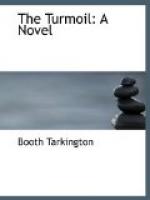It was a great night for Sheridan—the very crest of his wave. He sat there knowing himself Thane and master by his own endeavor; and his big, smooth, red face grew more and more radiant with good will and with the simplest, happiest, most boy-like vanity. He was the picture of health, of good cheer, and of power on a holiday. He had thirty teeth, none bought, and showed most of them when he laughed; his grizzled hair was thick, and as unruly as a farm laborer’s; his chest was deep and big beneath its vast facade of starched white linen, where little diamonds twinkled, circling three large pearls; his hands were stubby and strong, and he used them freely in gestures of marked picturesqueness; and, though he had grown fat at chin and waist and wrist, he had not lost the look of readiness and activity.
He dominated the table, shouting jocular questions and railleries at every one. His idea was that when people were having a good time they were noisy; and his own additions to the hubbub increased his pleasure, and, of course, met the warmest encouragement from his guests. Edith had discovered that he had very foggy notions of the difference between a band and an orchestra, and when it was made clear to him he had held out for a band until Edith threatened tears; but the size of the orchestra they hired consoled him, and he had now no regrets in the matter.
He kept time to the music continually—with his feet, or pounding on the table with his fist, and sometimes with spoon or knife upon his plate or a glass, without permitting these side-products to interfere with the real business of eating and shouting.
“Tell ’em to play ’Nancy Lee’!” he would bellow down the length of the table to his wife, while the musicians were in the midst of the “Toreador” song, perhaps. “Ask that fellow if they don’t know ’Nancy Lee’!” And when the leader would shake his head apologetically in answer to an obedient shriek from Mrs. Sheridan, the “Toreador” continuing vehemently, Sheridan would roar half-remembered fragments of “Nancy Lee,” naturally mingling some Bizet with the air of that uxorious tribute.
“Oh, there she stands and waves her hands while I’m away! “A sail-er’s wife a sail-er’s star should be! Yo ho, oh, oh! “Oh, Nancy, Nancy, Nancy Lee! Oh, Na-hancy Lee!”
“Hay, there, old lady!” he would bellow. “Tell ’em to play ’In the Gloaming.’ In the gloaming, oh, my darling, la-la-lum-tee—Well, if they don’t know that, what’s the matter with ‘Larboard Watch, Ahoy’? That’s good music! That’s the kind o’ music I like! Come on, now! Mrs. Callin, get ’em singin’ down in your part o’ the table. What’s the matter you folks down there, anyway? Larboard watch, ahoy!”
“What joy he feels, as—ta-tum-dum-tee-dee-dum steals. La-a-r-board watch, ahoy!”




